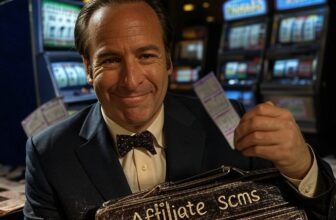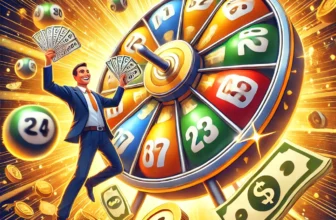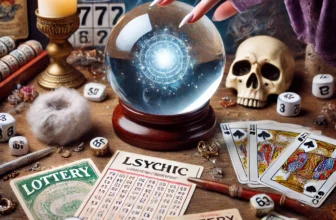You know that sweet, sweet daydream of waking up to a phone call that goes: “Congratulations, you’ve won the lottery!”? Well, reality check: that call might just be from a scammer who’s about to take you for a wild ride straight into the land of “empty bank accounts and crushed dreams.”
With the global market for online lotteries estimated at $16.6 billion in 2023 and projected to reach a whopping $29.9 billion by 2030, it seems the only people cashing in these days are the scammers. You may think, “Surely, I’d never fall for that.” Think again. Scammers are like cockroaches – for every one you squash, hundreds more are crawling around, waiting to pounce on your hard-earned cash.

What Is a Lottery Scam?
Picture this: you’re minding your own business, and suddenly, out of nowhere, you get an email, text, or call from a very “official” sounding person saying you’ve hit the jackpot. Of course, you haven’t bought a ticket, but hey, who cares about details when there’s a prize waiting?
They’ll tell you to keep your win a secret (because nothing says “legit” like a conspiracy) and to urgently contact their “claims agent,” who conveniently needs a small “processing fee” to transfer your imaginary millions. Spoiler alert: you pay the fee, and in return, you win… NOTHING. Not even a complimentary tissue to cry into.
Oh, and they love using the names of real lottery organizations like MegaMillions, EuroMillions, and PowerBall to make it all seem super legit. Because what better way to gain your trust than pretending to be someone credible?
How Does a Lottery Scam Work?
It’s not just about a cheeky email. These fraudsters are crafty. Once they reel you in with the promise of a life-changing windfall, they’ll start asking for your personal details – you know, your bank account, your ID, maybe even the name of your childhood pet.
But wait, there’s more! After you pay the “processing fees,” you’ll get one excuse after another as to why your winnings are delayed. Spoiler: those delays never end, but your bank balance will.
Common Sense 101: The Basics
Here’s a pro tip: You can’t win a lottery you didn’t enter. Shocking, right? If you haven’t bought a ticket, no one’s going to call you about a jackpot. These scammers aren’t just pulling your name out of a magical hat; they’ve gathered your info from viruses, spyware, and other delightful little tricks. They know your name from various shady sources, and they’re coming for your wallet.
Here’s an example of what these “You’re a Winner!” emails might look like:
“Congratulations! You’ve won a certified check for $300,000! No taxes! 100% free! Contact us immediately or forfeit your winnings!” Yeah, sounds totally legit… NOT.
Tips for Avoiding a Lottery Scam (Because Who Wants to Be THAT Person?)
- You must enter a lottery to win it. Radical concept, right?
- No real lottery will ask for your bank details over email or phone. Ever.
- You don’t need to pay to claim winnings. Like, ever. The only thing you pay is taxes – and that’s after you’ve got the money.
- If someone tells you to keep your win a secret, run – that’s a scam alarm blaring in your ear.
- Poor grammar and spelling in emails? Hello, red flag! No reputable lottery company sends out messages that read like a 12-year-old’s text conversation.
What to Do if You Fall for It (No Judgment, It Happens)
Let’s say, for argument’s sake, you’ve already handed over some cash or personal details to a scammer. It happens to the best of us. But don’t panic – there are things you can do:
- If you paid with a credit or debit card, call your bank right now. Tell them it was a fraudulent charge. They might reverse it.
- If you gave away your Social Security number, head over to IdentityTheft.gov and start damage control.
- Paid with a gift card? Call the gift card issuer immediately. Yes, gift cards – because why steal money when scammers can make you buy a Best Buy card to “claim” your winnings?
- And lastly, if you’ve shared your password, change it. Like, yesterday.

Here are some examples of some well known lottery scams:
Mavis L. Wanczyk Lottery Scam
Ah, the infamous “Mavis L. Wanczyk” email scam—a masterclass in audacity and a testament to the boundless creativity of scammers. For those blissfully unaware, Mavis Wanczyk is the Massachusetts woman who, in 2017, snagged a $758.7 million Powerball jackpot. Naturally, scammers saw this as their golden ticket to dupe the unsuspecting masses.

Here’s how the scam unfolds: you receive an email from “Mavis” herself, brimming with generosity and a burning desire to share her newfound wealth with you, a complete stranger. The email gushes about how she’s randomly selected you to receive a hefty sum—because, of course, that’s how multimillionaires distribute their fortunes. All you need to do is provide some personal information and perhaps a small “processing fee” to claim your prize. What could possibly go wrong?
Let’s pause for a reality check. If you believe that a lottery winner is scouring the internet to hand out cash to random individuals, I have a bridge to sell you. The only thing you’ll win from this scam is a front-row seat to identity theft and financial loss. Remember, legitimate lottery winners don’t cold-email strangers with offers of free money. And if they did, they’d probably start with their own family and friends, not you.
So, the next time “Mavis” pops into your inbox with promises of riches, do yourself a favor: hit delete, have a chuckle at the sheer brazenness, and maybe buy a real lottery ticket if you’re feeling lucky. At least that way, your odds of winning are slightly better than zero.
The Eddie Tipton Scandal
Eddie Tipton, a former information security director at the Multi-State Lottery Association in the U.S., orchestrated one of the most notorious lottery scams. He manipulated the random number generator software to predict winning numbers, allowing him and his accomplices to claim jackpots across multiple states. Their scheme unraveled in 2015, leading to Tipton’s conviction and imprisonment.
The “El Gordo” Spanish Lottery Scam
Scammers have exploited the popularity of Spain’s “El Gordo” lottery by sending unsolicited emails and letters informing recipients they’ve won a substantial prize. Victims are instructed to pay fees or provide personal information to claim their winnings. In reality, these communications are fraudulent, aiming to steal money and identities.
The Jamaican Lottery Scam
Originating in Jamaica, this scam involves fraudsters contacting individuals, often seniors, claiming they’ve won a lottery or sweepstakes. Victims are persuaded to pay taxes or fees upfront to receive their prize. These scams have led to significant financial losses and have been the subject of extensive law enforcement efforts.
The Canadian Lottery Scam
Similar to the Jamaican scam, fraudsters contact victims, typically in the U.S., claiming they’ve won a Canadian lottery. Victims are asked to pay fees or taxes to claim their prize. These scams have resulted in substantial financial losses and have been the focus of cross-border investigations.
A Parting Thought
Lottery scams are like that relative you avoid at family dinners: always lurking, waiting for the chance to ruin your day. Don’t give them that satisfaction. Stay sharp, stay cynical, and remember, the only time someone’s giving away free money is when elephants fly.
Got scammed? Don’t feel bad. Report it. Then pour yourself a glass of something strong and try to remember – if it sounds too good to be true, it probably is.
Lottery scams are on the rise, wherein you can get scammed in unexpected ways. There are many lottery scam examples on the internet so we suggest to do some research. Always stay alert and act as quickly as possible in case a fraud occurs.
References:
Research and Markets. “Online Lottery – Global Strategic Business Report.” Accessed September 25, 2024.
Beat Lottery : Lottery Scam Emails







